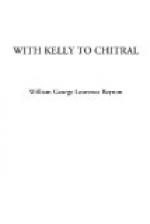In the meantime, every available coolie and pony had been collected, and we calculated on being able to start the next morning, with ten days’ rations for the whole force. By 6 A.M. on the 1st April the troops had fallen in and were ready to start, and a nice handy little lot we had. Four hundred Pioneers, two mountain guns, forty Kashmir Sappers and a hundred Levies. Then the coolies were told to load up, and the trouble began. It now appeared that some hundred coolies and ponies from Yasin had bolted during the night. We had put too much faith in Mihrbhan Shah’s influence, and all those villagers who were not directly under his government had gone. Those hundred coolies meant the transport of our supplies, and without them we should only have the food actually carried in the men’s haversacks. We had cut down our baggage to the vanishing point, and the men were carrying all they could, and we did not dare leave our reserve ammunition behind.
The column had just moved off when this state of things became known and was reported to me. Colonel Kelly was at the head of the column, so I snatched the nearest pony, tumbled its load on to the ground, and went scrambling through the snow after the troops. Of course there was nothing to be done except halt the column until the coolies could be collared and brought back, so Stewart, who had a battery pony with him, was sent off down the road after the absconding coolies. They must have started the evening before, as he only caught a few of them up fifteen miles back, and had great difficulty in bringing them along with him. We met him as we were returning to Ghizr at seven o’clock that evening. Stewart had scarcely gone ten minutes before some fifty coolies were found hiding in a village; they were soon driven out and made to lift their loads. This gave us some six days’ rations, and with it we moved off, our great object being to get across the pass and open communications with Mastuj. After that we could see about getting on to Chitral. Our transport consisted of country ponies and coolies, and I remained behind to see the last off and rearguard moving before I started myself.
About two miles from Ghizr post there was a steep ascent where the road twisted and curled among a mass of debris fallen from the cliffs above, and in one place the ponies had to be helped through a narrow passage between two fallen boulders. About midday I caught up the tail of the troops, who were already past the village of Teru, the highest inhabited spot in the valley; there are only a few houses, and these are scattered about in clumps a few hundred yards apart. Passing on, I caught up the battery, and reached the leading infantry, when suddenly the word to halt was passed down the long line.




